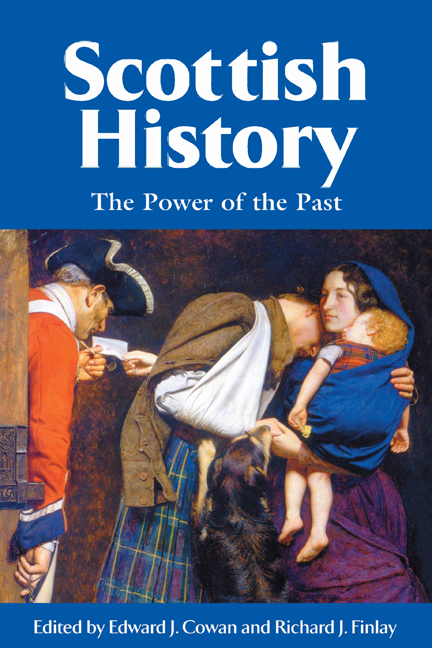Book contents
- Frontmatter
- Contents
- Contributors
- Introduction
- 1 The Picts‘ Place in the Kingship's Past Before John of Fordun
- 2 The Demonisation of King John
- 3 Late Medieval Scotland and the Matter of Britain
- 4 In Search of the Scottish Reformation
- 5 Civil Society and the Celts: Hector Boece, George Buchanan and the Ancient Scottish Past
- 6 The Covenanting Tradition in Scottish History
- 7 ‘What's in a Name?’: Pedigree and Propaganda in Seventeenth-Century Scotland
- 8 The Ideological Uses of the Picts, 1707-c.1990
- 9 The Jacobite Cult
- 10 Queen Victoria and the Cult of Scottish Monarchy
- 11 ‘Their Laurels Wither'd, and their Name Forgot’: Women and the Scottish Radical Tradition
- 12 Tomorrow's Ancestors: Nationalism, Identity and History
- Index
Introduction
Published online by Cambridge University Press: 24 September 2020
- Frontmatter
- Contents
- Contributors
- Introduction
- 1 The Picts‘ Place in the Kingship's Past Before John of Fordun
- 2 The Demonisation of King John
- 3 Late Medieval Scotland and the Matter of Britain
- 4 In Search of the Scottish Reformation
- 5 Civil Society and the Celts: Hector Boece, George Buchanan and the Ancient Scottish Past
- 6 The Covenanting Tradition in Scottish History
- 7 ‘What's in a Name?’: Pedigree and Propaganda in Seventeenth-Century Scotland
- 8 The Ideological Uses of the Picts, 1707-c.1990
- 9 The Jacobite Cult
- 10 Queen Victoria and the Cult of Scottish Monarchy
- 11 ‘Their Laurels Wither'd, and their Name Forgot’: Women and the Scottish Radical Tradition
- 12 Tomorrow's Ancestors: Nationalism, Identity and History
- Index
Summary
When T. S. Eliot famously wrote of time present and time past as existing in time future, he failed to mention the equally intriguing conundrum of the present in the past, the way in which we approach history by reading our own contemporaneous values, obsessions and concerns into it. Too often, in what we flatter ourselves is the era of the post-modern, the past is pejoratively made present, or as others might say, relevant. Agathon wrote that ‘even God cannot change the past’ but historians alter it on a daily basis, though the presumption is based, it is to be hoped, upon frailty rather than any sense of numinous competitiveness. The central theme of this book is twofold: the investigation of the power of the past to confer legitimacy upon present thought or action, and to explore the ways in which previous generations rewrote, manufactured and manipulated history to suit their own present contingencies and preoccupations. Historians at all times, whether subconsciously or otherwise, to a greater or lesser extent, always create the past in their own image to the point that we can learn much about the attitudes of successive societies by examining how certain icons change over time. For example, the William Wallace commemorated in the Abbey Craig monument at Stirling bore very little relationship to the individual who was butchered at Smithfield. The historical Mary Queen of Scots is barely recognisable in a recent study of the Marian cult. The Scot confronting the increasingly numerous studies on the Scottish Enlightenment of the eighteenth century often has the uneasy feeling of visiting confusingly alien territory.
History has always been with us but as an academic discipline it is, historically speaking, a fairly recent phenomenon. For most of history, history as we now understand it did not exist, or rather, what was available was known to comparatively few since society at large depended mainly upon the oral, as opposed to the written, medium. The Enlightenment inspired the movement to reconstruct the past on the basis of the known facts and evidence. Scots were at the forefront of this process, which was one of rediscovery rather than of innovation, for its practitioners were inspired by the historians of the classical world.
- Type
- Chapter
- Information
- Scottish HistoryThe Power of the Past, pp. 1 - 10Publisher: Edinburgh University PressPrint publication year: 2020



